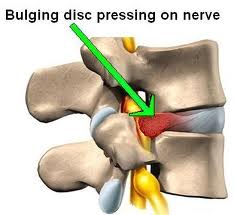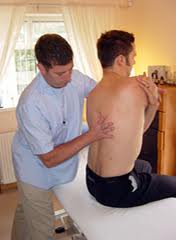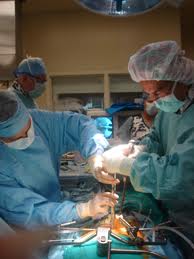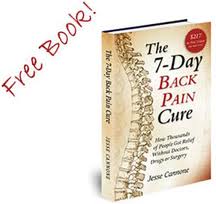|
Herniated DiscAge-related Back Painage-well.org > spinal column > herniated disc Low back pain will affect four out of five people during their lifetime. A herniated disc is one of the most common causes of both back and leg pain, but the pain from this condition can also sometimes be felt in the shoulders, arms or hips. This condition is also often referred to as "slipped" or "ruptured" disc or undiagnosed people will often talk about “putting their back out”.
What is a Herniated Disc?
Discs are soft cushions found between the vertebrae that make up the spinal column (your backbone). In the middle of the spinal column is the spinal canal, a hollow space that contains the spinal cord. The nerves that supply the arms, leg, and torso come from the spinal cord. The nerves from the neck supply the arms and hands, and the nerves from the low back supply the butt and legs. The discs between the vertebrae allow the back to move freely and act like shock absorbers. The disc is made up of two main sections. The outer part (the annulus) is made up of tough cartilage that is comprised of series of rings. The center of the disc is a jelly-like substance called the nucleus pulposus. A disc herniates or ruptures when part of the jelly center pushes through the outer wall of the disc into the spinal canal, and puts pressure on the nerves. A disc bulge is when the jelly substance pushes the outer wall but doesn't completely go through the wall. What are the Symptoms of a Herniated Disc?The most common symptom of a herniated disc is “sciatica”. Sciatica is best described as a sharp, often shooting pain that begins in the buttocks and goes down the back of one leg. This is most often caused by pressure on the sciatic nerve that exits the spinal cord. Other symptoms include:
How do you know you have a herniated disc?Your medical history is key to a proper diagnosis. A physical examination can usually determine which nerve roots are affected (and how seriously). A simple x-ray may show evidence of disc or degenerative spine changes. An MRI (magnetic resonance imaging) is usually the best option (most expensive) to determine which disc has herniated. Why do discs herniate?
Discs are primarily composed of water. As we become older (after the age of 30), the water content decreases, so the discs begin to shrink and lose their shape. When the disc becomes smaller the space between the vertebrae decreases and become narrower. Also, as the disc loses water content the disc itself becomes less flexible. While aging, excess weight, improper lifting and the decrease in water in the discs all contribute to the breaking down of discs, the primary cause of a herniation or bluge is uneven compression and torsion that's placed on the discs. This uneven pressure is caused by muscular imbalances that pulls the spine out of its normal position and then your body is forced to function in what I call a physical dysfunction. Every human being develops these dysfunctions over time and eventually they cause enough damage to create pain. Will Going to the Gym Help?If light exercise make your back feel better, a gentle workout routine on a regular basis may help.This will get your blood flowing bringing needed oxygen to your muscles and will stop them from seizing up. However, proceed with caution - If you work out too soon or too hard, you may risk re-injuring your low back. What are my treatment options
Just because a disc has herniated does not necessarily mean that you will need to undergo surgery. In the majority of cases, a herniated disc will probably not require surgery. Treatment of a herniated disc depends on the symptoms. It also depends on whether the symptoms are getting steadily worse - or whether they are getting better. If the symptoms are getting steadily worse, your doctor may be more likely to suggest surgery. If the symptoms are getting better, he may suggest watching and waiting to see if the symptoms go away. Many people, who initially have problems due to a herniated disc, find that they completely resolve over several weeks or months. You may not need any treatment other than watching to make sure that the problem does not progress. If the pain is bearable and there is no progression of weakness or numbness, your doctor may just suggest watching and waiting. Rest: If the pain is severe, you may need to rest for several days before excercising again gradually. To do this, start with a gentle walking program and increase the distance you walk each day. Pain medication: Over-the-counter pain relievers, such as ibuprofen, Tylenol, and other anti-inflammatory medications may help reduce your pain. If these do not help your doctor may prescribe stronger pain medication. Epidural Steroid Injection (ESI): ESI is reserved for severe pain and is only about 50% successful but your doctor might decide to try it to avoid surgery. Surgical Treatment: The traditional way of treating the herniated disc with surgery is to perform a laminotomy and discectomy. The term laminotomy means "make an opening in the lamina", and the term discectomy means "remove the disc". This procedure is performed through an incision down the center of the back over the area of the herniated disc. The surgeon locates the disc material that has ruptured into the spinal canal and removes it. This removes any pressure and irritation on the nerves of the spine. Just as knee surgery can now be done with "keyhole" surgery, spinal surgery is now often performed using this method, which shortens the recovery time. Endoscopic Discectomy is another treatment that is evolving although it is not widely used yet. Just as microdiscetomy shortens recovery time because a smaller incision doe less damage to the spinal tissue, this procedure has the benefit that it does even less damage to the normal tissues around the spine during the operation. This can lead to a still faster recovery and less complications. Other Treatments There are other treatments such as ice/heat, ultrasound, electrical stimulation, cortisone injections, which have not been mentioned here, but which have brought relief to many people. While all these may deliver some relief, it will often be temporary, if at all.
Some Remedies that WorkTreating the Underlying ConditionThe major problem with these traditional treatments is that they can't fix or heal a herniated disc as they do not address the actual cause of the problem. For example, even if you were to have a surgery and get some pain relief, the fact is the dysfunctions that caused the disc to herniated in the first place are still there and if not addressed, they will continue to place uneven pressure and strain on the discs and sooner or later you will likely have another problem with that disc, or others. Without identifying and addressing the underlying cause of the problem, which is the physical dysfunctions caused by imbalances in muscles, you will likely continue to suffer with this condition and the continuous flare ups for years. Unfortunately, most doctors, chiropractors and physical therapists don't spend time or focus on identifying the physical dysfunctions that are responsible for the condition so most people end up jumping from one useless traditional treatment to the next and suffer for months or years unnecessarily. If you have been diagnosed with a herniated disc, or are wondering if your back pain may be caused by a herniated disc, either way you must identify and address the physical dysfunctions that are causing your pain as part of your recovery.
Some Free Gifts for YouCongratulations!! You got through all that information (YOU DIDN'T CHEAT, DID YOU?) and, as a reward, we have some free gifts for you here:-

Try this 7 day back cure free of charge for a limited period only - you can also get access to the online version and also avoid shipping charges. If you download now, there is also a special offer which allows you to donate money to your favorite charity. So don't delay, start now to cure your aching back! and rid yourself of back problems once and for all. (Source: The Healthy Back Institute)
ResourcesHerniated Disc - Comprehensive spinal resource written by a recovered patient. Learn all about disc herniations, degenerative disc disease and bulging disc treatment options. age-well.org > spinal column > herniated disc Top of Herniated Disc |
Subscribe to E-zine
Table of Contents
|
|
|
The Spinal Column & Back Problems
|
|
The Human Spine
|
|
Back Problems
|
|
Lower Back Pain
|
|
Herniated Disc
|
|
Piriformis Syndrome
|
|
Piriformis Test
|
|
Piriformis Exercises
|
|
Chiropractic Treatment
|
|
Acupuncture for Lumbago
|
|
Back Care
|
Related Issues
|
Osteoarthritis
|
|
Joint Replacement
|
|
Osteoporosis
|
|
Drink Plenty of Water
|
|
Incontinence
|
Free Back Pain Relief Offers
Free Back Pain Relief Offers

Links to Related Pages
Links to Related Pages

















